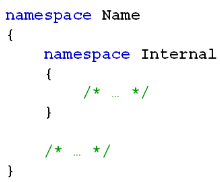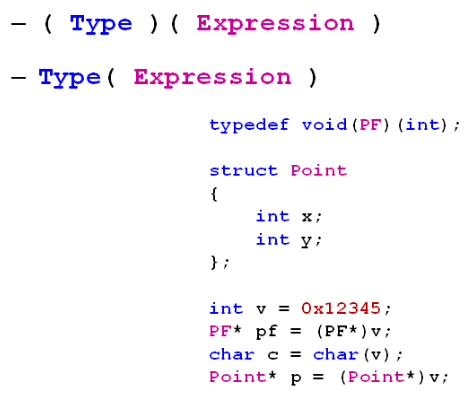0.目录
1.动态内存分配
- 1.1 C++中的动态内存分配
- 1.2 new关键字与malloc函数的区别
- 1.3 new关键字的初始化
2.命名空间
- 2.1 作用域与命名空间
- 2.2 命名空间的定义和使用
3.强制类型转换
- 3.1 C方式的强制类型转换
- 3.2 C++的新式类型转换
4.小结
1.动态内存分配
1.1 C++中的动态内存分配
- C++中通过new关键字进行动态内存申请
- C++中的动态内存申请是基于类型进行的
- delete关键字用于内存释放

1.2 new关键字与malloc函数的区别
- new关键字是C++的一部分
- malloc是由C库提供的函数
- new以具体类型为单位进行内存分配
- malloc以字节为单位进行内存分配
- new在申请单个类型变量时可进行初始化
- malloc不具备内存初始化的特性
1.3 new关键字的初始化

2.命名空间
2.1 作用域与命名空间
在C语言中只有一个全局作用域:
- C语言中所有的全局标识符共享同一个作用域
- 标识符之间可能发生冲突
C++中提出了命名空间的概念:
- 命名空间将全局作用域分成不同的部分
- 不同命名空间中的标识符可以同名而不会发生冲突
- 命名空间可以相互嵌套
- 全局作用域也叫默认命名空间
2.2 命名空间的定义和使用
C++命名空间的定义:

C++命名空间的使用:
使用整个命名空间:using namespace name;
使用命名空间中的变量:using name::variable;
使用默认命名空间中的变量:::variable;
示例:
#include <stdio.h>
namespace First
{
int i = 0;
}
namespace Second
{
int i = 1;
namespace Internal
{
struct P
{
int x;
int y;
};
}
}
int main()
{
using namespace First;
using Second::Internal::P;
printf("First::i = %d
", i);
printf("Second::i = %d
", Second::i);
P p = {2, 3};
printf("p.x = %d
", p.x);
printf("p.y = %d
", p.y);
return 0;
}
运行结果:
[root@bogon Desktop]# g++ test.cpp
[root@bogon Desktop]# ./a.out
First::i = 0
Second::i = 1
p.x = 2
p.y = 3
3.强制类型转换
3.1 C方式的强制类型转换
C方式的强制类型转换:

示例:
#include <stdio.h>
typedef void(PF)(int);
struct Point
{
int x;
int y;
};
int main()
{
int v = 0x12345;
PF* pf = (PF*)v;
char c = char(v);
Point* p = (Point*)v;
pf(5);
printf("p->x = %d
", p->x);
printf("p->y = %d
", p->y);
return 0;
}
运行结果:
[root@bogon Desktop]# g++ test.cpp
[root@bogon Desktop]# ./a.out
Segmentation fault (core dumped)
编译器虽然可以编译通过,但是无法运行!
存在的问题:
- 过于粗暴——任意类型之间都可以进行转换,编译器很难判断其正确性
- 难于定位——在源码中无法快速定位所有使用强制类型转换的语句
问题:强制类型转换在实际工程中是很难完全避免的!如何进行更加安全可靠的转换?
3.2 C++的新式类型转换
C++将强制类型转换分为4个不同的类型:

static_cast强制类型转换——静态类型转换
- 用于基本类型间的转换
- 不能用于基本类型指针间的转换
- 用于有继承关系类对象之间的转换和类指针之间的转换
const_cast强制类型转换
- 用于去除变量的只读属性
- 强制转换的目标类型必须是指针或引用
reinterpret_cast强制类型转换
- 用于指针类型间的强制转换
- 用于整数和指针类型间的强制转换
dynamic_cast强制类型转换——动态类型转换
- 用于有继承关系的类指针间的转换
- 用于有交叉关系的类指针间的转换
- 具有类型检查的功能
- 需要虚函数的支持
示例:
#include <stdio.h>
void static_cast_demo()
{
int i = 0x12345;
char c = 'c';
int* pi = &i;
char* pc = &c;
c = static_cast<char>(i);
pc = static_cast<char*>(pi); // Error
}
void const_cast_demo()
{
const int& j = 1;
int& k = const_cast<int&>(j);
const int x = 2;
int& y = const_cast<int&>(x);
int z = const_cast<int>(x); // Error
k = 5;
printf("k = %d
", k);
printf("j = %d
", j);
y = 8;
printf("x = %d
", x);
printf("y = %d
", y);
printf("&x = %p
", &x);
printf("&y = %p
", &y);
}
void reinterpret_cast_demo()
{
int i = 0;
char c = 'c';
int* pi = &i;
char* pc = &c;
pc = reinterpret_cast<char*>(pi);
pi = reinterpret_cast<int*>(pc);
pi = reinterpret_cast<int*>(i);
c = reinterpret_cast<char>(i); // Error
}
void dynamic_cast_demo()
{
int i = 0;
int* pi = &i;
char* pc = dynamic_cast<char*>(pi); // Error
}
int main()
{
static_cast_demo();
const_cast_demo();
reinterpret_cast_demo();
dynamic_cast_demo();
return 0;
}
运行结果为:
[root@bogon Desktop]# g++ test.cpp
test.cpp: In function ‘void static_cast_demo()’:
test.cpp:11: error: invalid static_cast from type ‘int*’ to type ‘char*’
test.cpp: In function ‘void const_cast_demo()’:
test.cpp:22: error: invalid use of const_cast with type ‘int’, which is not a pointer, reference, nor a pointer-to-data-member type
test.cpp: In function ‘void reinterpret_cast_demo()’:
test.cpp:47: error: invalid cast from type ‘int’ to type ‘char’
test.cpp: In function ‘void dynamic_cast_demo()’:
test.cpp:54: error: cannot dynamic_cast ‘pi’ (of type ‘int*’) to type ‘char*’ (target is not pointer or reference to class)
将出错的几行代码注释后:
#include <stdio.h>
void static_cast_demo()
{
int i = 0x12345;
char c = 'c';
int* pi = &i;
char* pc = &c;
c = static_cast<char>(i);
//pc = static_cast<char*>(pi); // Error
}
void const_cast_demo()
{
const int& j = 1;
int& k = const_cast<int&>(j);
const int x = 2;
int& y = const_cast<int&>(x);
//int z = const_cast<int>(x); // Error
k = 5;
printf("k = %d
", k);
printf("j = %d
", j);
y = 8;
printf("x = %d
", x);
printf("y = %d
", y);
printf("&x = %p
", &x);
printf("&y = %p
", &y);
}
void reinterpret_cast_demo()
{
int i = 0;
char c = 'c';
int* pi = &i;
char* pc = &c;
pc = reinterpret_cast<char*>(pi);
pi = reinterpret_cast<int*>(pc);
pi = reinterpret_cast<int*>(i);
//c = reinterpret_cast<char>(i); // Error
}
void dynamic_cast_demo()
{
int i = 0;
int* pi = &i;
//char* pc = dynamic_cast<char*>(pi); // Error
}
int main()
{
static_cast_demo();
const_cast_demo();
reinterpret_cast_demo();
dynamic_cast_demo();
return 0;
}
运行结果为:
[root@bogon Desktop]# g++ test.cpp
[root@bogon Desktop]# ./a.out
k = 5
j = 5
x = 2
y = 8
&x = 0x7ffd5a6a5650
&y = 0x7ffd5a6a5650
4.小结
- C++中内置了动态内存分配的专用关键字
- C++中的动态内存分配可以同时进行初始化
- C++中的动态内存分配是基于类型进行的
- C++中命名空间概念用于解决名称冲突问题
- C方式的强制类型转换
- 过于粗暴
- 潜在的问题不易被发现
- 不易在代码中定位
- 新式类型转换以C++关键字的方式出现
- 编译器能够帮助检查潜在的问题
- 非常方便的在代码中定位
- 支持动态类型识别( dynamic_cast )